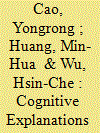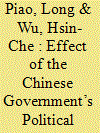| Srl | Item |
| 1 |
ID:
179268


|
|
|
|
|
| Summary/Abstract |
In recent years, the economic development of China and India and their border confrontations have intensified bilateral strategic competition. This study used the State of Democracy in South Asia survey to identify dual mindsets of competition and contingency that drive how Indians perceive China’s influence in Asia. These two mindsets are based on a cognitive schema characterized by a political predisposition against China. However, this negative orientation is moderated as more information is acquired regarding the impact of China on India. The competition mindset does not always manifest itself, and is only cognitively activated when a change is perceived in India’s power status. On the other hand, the contingent principle appears whenever competition seems to have abated, or disadvantage seems unavoidable. The mindsets of competition and contingency are not only relevant to the evolution of Sino–Indian relations, but also explain how Indian policymakers behave and respond in international society.
|
|
|
|
|
|
|
|
|
|
|
|
|
|
|
|
| 2 |
ID:
191594


|
|
|
|
|
| Summary/Abstract |
While China has been experiencing rapid economic growth, its conflicts with the United States have become more public. In particular, the argument that the Chinese government can easily gain public support in establishing and promoting national policies under its authoritarian regime has been on the rise. With this background, this study conducts an empirical analysis of data from 4,366 survey respondents using ordinary least squares and ordered logit models to analyze the effect of the Chinese government’s political propaganda and individual characteristics on anti-US sentiment. The results suggest that this propaganda strengthens anti-US sentiment. As for individual characteristics, party officials have stronger anti-US sentiment. Moreover, interacting exposure to political propaganda with the main variables suggests that members of the Communist Party of China, national minorities, and rural residents have stronger anti-US sentiment, presumably because they are more influenced by political propaganda.
|
|
|
|
|
|
|
|
|
|
|
|
|
|
|
|
| 3 |
ID:
181211


|
|
|
|
|
| Summary/Abstract |
This article compares official statements on democracy and ordinary people’s understandings of the term to examine whether government propaganda works to shape the democratic conceptions of the masses. The findings show that official narratives centered on ‘good governance’ have gradually been picked up by ordinary people over time. While the finding could be interpreted as solely the outcome of top-down state propaganda, the authors argue that the mechanism involves two-way communication whereby Chinese leaders have incorporated elements of traditional culture as well as the concerns of ordinary people into their narratives of democracy, leading to a convergence between the elite and the masses. This two-way process has allowed ‘democracy with Chinese characteristics’ to become a viable counterpoise to liberal democracy in China.
|
|
|
|
|
|
|
|
|
|
|
|
|
|
|
|